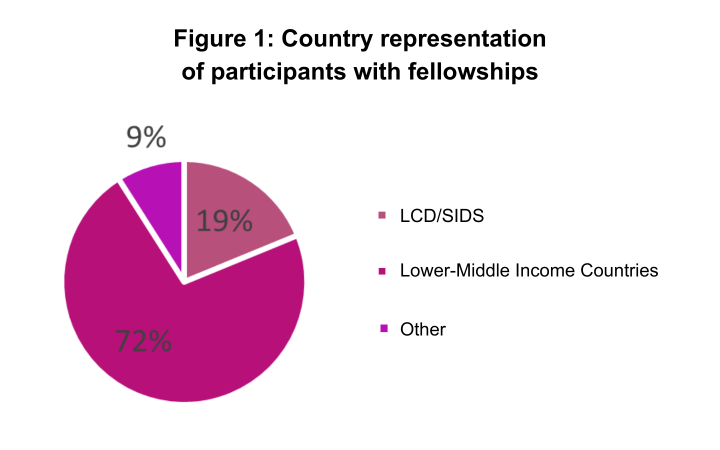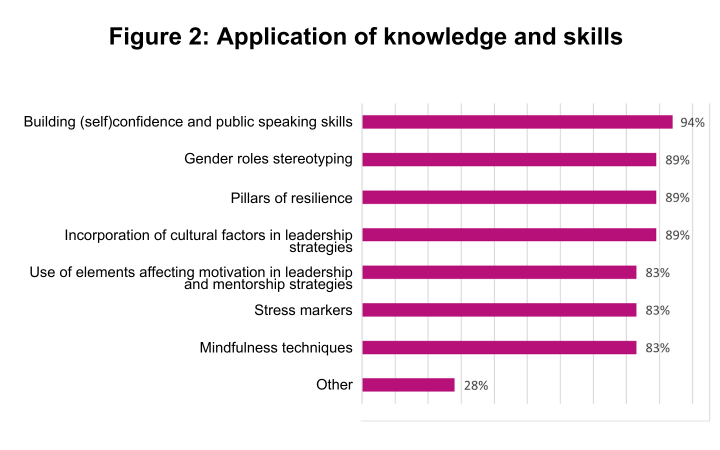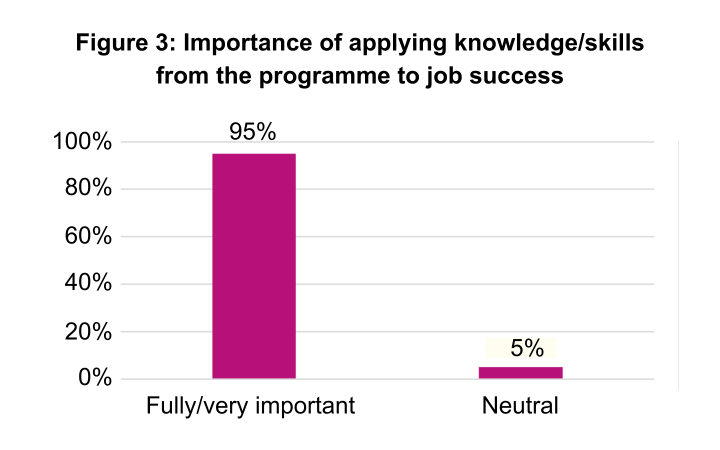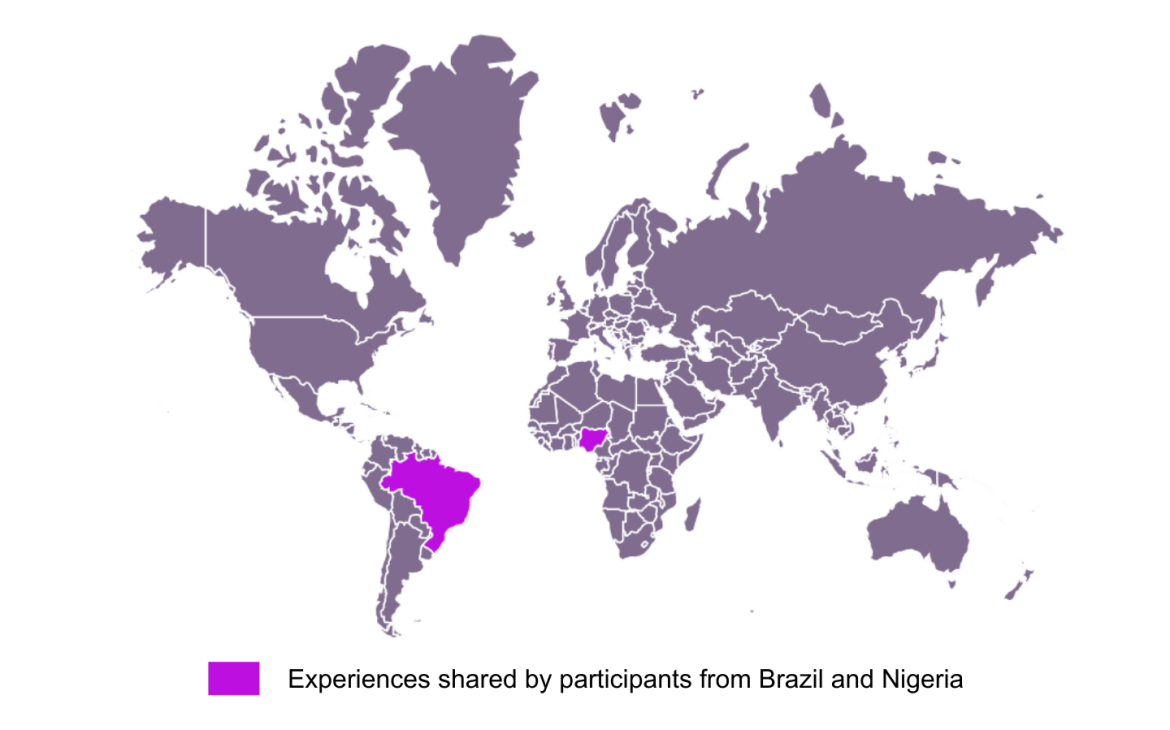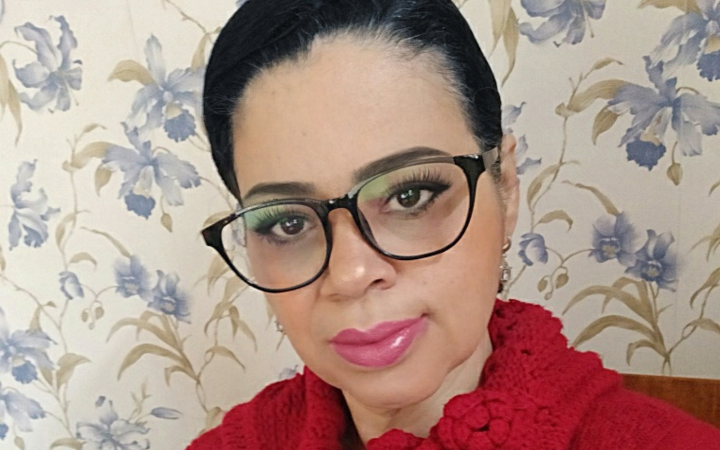Background
In a bid to enhance efforts towards attaining gender equality and women’s empowerment across societies, UNITAR has held five online workshops on gender, women’s leadership and mentoring. The main objective of the workshops was to foster the implementation of gender equality in the participants’ workplaces through increasing women representation in leadership roles and to forge partnerships with other actors in the field of gender, women’s leadership and mentoring. The workshops also sought to build leadership skills and the capacity of women to participate in all levels of decision-making. The workshops further aimed at instilling high levels of confidence and self-reliance to women as a means of empowerment in both their professional and private lives. In particular, the workshops incorporated training on gender roles, public speaking, stress management, incorporation of cultural factors in leadership, and mindfulness techniques. The online workshops targeted women in leadership positions and were held in July, October, November and December 2021 with each lasting three days. This impact story focuses on data and experiences of participants who attended the e-workshop delivered in July 2021.
The course learning objectives aimed at building the participants’ capacity to:
- Use their individual talents in their working environment more efficiently;
- Develop their own personal leadership style by analyzing different approaches to leadership;
- Build up a strong, sustainable and supporting network of engaged (future) female leaders to increase the visibility of women’s skills, talents and leadership at the workplace;
- Reinforce management change towards a more inclusive, gender-sensitive organizational culture.
The workshops received high demand from across the world as 400 women sent in their applications. 151 women from 36 countries were selected for training with 133 of those selected receiving full fellowship for the workshop and the rest were self-funded. Of the women awarded with fellowships, 25 came from Least Developed Countries (LDCs) or Small Island Developing States (SIDS) and 96 from lower middle-income countries as illustrated in Figure 1. Additionally, out of the 133 women who received fellowships, 86 were from countries ranked in the lowest third of the Global Gender Gap Index and 32 women were from countries ranked in the second third.
Follow-up surveys to the workshops indicated that the majority of the participants found the workshops to be useful with an increased awareness of gender-related issues showcasing the great success of the workshops. Several participants further suggested an increase in the number of days of the workshops.
Application of knowledge and skills
Responses were received from 26 participants from a follow-up survey conducted to determine the influence of the training event on the women’s professional and personal lives. Thirty-five per cent of respondents indicated that they hold managerial or senior staff positions in private organizations or corporations while 23 per cent are at junior to mid-level positions in public institutions. With 69 per cent of respondents noting that they had already taken part in other trainings related to leadership or management skills, the respondents indicated an average of 74 per cent of applied knowledge and skills as being directly attributed to the training event.
Eighty-five per cent of respondents indicated that they have applied or transferred the knowledge and skills from the training event. In particular, 94 per cent have applied skills on building self-confidence and public speaking skills and 88 per cent have applied knowledge and skills on incorporating cultural factors in leadership strategies. Figure 2 further illustrates the rate of application of the different knowledge and skills.
Eighty-nine per cent of the respondents further indicated that they have observed changes from the colleagues they supervise at their workplace as a result of the training. Some of these changes were highlighted by respondents as:
My male colleagues are now paying attention to the tone they use and the terms they choose when discussing an issue with a female staff.
There is more tolerance and understanding amongst workers. They try to ensure high quality connections when relating with one another.
They are more respectful, and I can engage easily.
Additionally, 53 per cent of the respondents indicated that they often apply the knowledge and skills to their work with 95 per cent noting that the application of the knowledge and skills is fully or very important for their job success as illustrated in figure 3. Knowledge and skills identified as important for job success include confidence, leadership skills, communication, mindfulness, stress management, networking and team management. Sixty-one per cent further recorded that they are very confident in applying or transferring the knowledge and skills from the workshops to their work. Several areas of knowledge and skill were identified by the respondents as key which they have confidence in applying to their work including public speaking, leadership, self-awareness, networking, conflict resolution, team building, communication and incorporation of culture in leadership strategies.
Opportunity and confidence to apply knowledge and skills were recorded as the main driving factors allowing the respondents to apply the knowledge and skills to their work. However, lack of available time was indicated as the main hindrance towards the application on knowledge and skills by the respondents.
I have used the concepts of mindfulness to manage distractions and also to watch out for my personal biases affecting my decision making.
Specifically including gender figures in HR structure presentation showing WOMEN references at leading positions.
I have applied the mindfulness skill and also the stress management techniques. My approach to situations and circumstances has also been modified as I try to incorporate cultural diversity and my approach interacting with my colleagues.
Four participants from the workshops, two from Nigeria and two from Brazil, share their experiences in this impact story to better capture the impacts of the workshops on the participants’ professional and personal lives.
Adriana Silva
Adriana Silva
Social Worker and Family Counsellor
Gaining gender and leadership skills for community and women empowerment
Lajedo, Pernambuco, Brazil. Adriana Da Silva is a volunteer social worker and has been a family counsellor for six years, helping families in vulnerable conditions in low-income communities. Six years ago, Adriana engaged in social work as a means of enhancing the economic growth of the community around her and women empowerment. Later, community members joined her efforts and decided together with 10 other volunteers (8 women and 2 men) to create an NGO called “new life opportunities” with the main goal to support families in building a way out of poverty, e.g. through classes on entrepreneurship to women. Adriana has been elected to lead the NGO and finance its work. The team organizes festivals to collect money and meets with the mayor to raise awareness about the issues of the community. Examples of her work include supporting women by teaching artisanal arts and showing them possible income sources by selling crafts or cooked meals so that women can bring income to their households. Next to the NGO work, Adriana is currently studying psychoanalysis and will have her final exam in June 2022.
Adriana decided to sign up for the course to reinforce her community methods, facilitate trust building and gain more confidence. And it had the desired effect, as according to her, after the workshop, she felt “like Cinderella, as everything is now shining”.
Adriana now feels more aware to use communication skills, e.g. how to deliver a speech. She used to be very shy, but now after the course, she finds it simple to deliver a speech and is not shy anymore, be it in her professional or personal life. This also applies to her studies, during which she never dared to talk as she was hearing an inner voice that prevented her from sharing her thoughts. Moreover, Adriana was shaking when doing public speaking, particularly in the context of speaking to people from different social classes with different perspectives on women empowerment. After the course, her classmates noted her change of behavior and described it as “Ms Silence now wants to hug the world” and Adriana reports feeling more security and trust in herself.
Adriana believes that the communication skills from the course were particularly useful for her work as they helped her to discuss gender issues in a more structured way by using pertinent arguments to convince her colleagues to be sensitive to gender issues. In her area of work, full gender inclusivity is still being questioned, but after the course, she looked at it in a more positive way by changing her way of communicating about it. She established more eye contact and used illustrating videos in her presentation that made others see her as a human being and not as someone of a specific gender. She has also organized a meeting with the co-volunteers to share her skills on gender inclusivity.
Resilience skills are particularly important for her job success. Sometimes things do not work well in the volunteering work, e.g. when there is no electricity, no clean water, or when team members are less motivated. Even in those situations that she previously experienced as being stressful, she now remains calm and used positive psychology to explain to others that they are part of the team and that together they go further. After the course, she became more solution-oriented and this had a positive effect on other team members and community members who felt their tasks were important and valued and showed more commitment to contribute.
In terms of leadership skills, Adriana had the feeling the course was like “opening a gift box.” Adriana is now sitting together every weekend with the other volunteers and they discuss issues such as stress management. She creates an environment that makes them feel more comfortable to share and that they are not in competition but working hand in hand. One example of a situation they have discussed was when one of the volunteer colleagues felt demotivated because she could not find a place to breastfeed her baby and had to rush back and forth between locations. Adriana took the initiative to create a room for breastfeeding in which a mother would feel comfortable. Her colleague got the feeling that others cared about her being part of the team and immediately re-engaged more in her work. Equally, the two men who are part of the volunteering team seem to be more open-minded and receptive now. The women in the volunteering team have also received a boost in their self-esteem and are more confident of their role and importance. Adriana further shared a poem with the women which she learned from the workshop, Still I Rise by Maya Angelou. The poem addresses the use of self-esteem and self-respect to overcome challenges. As a result, the team became more confident and more effective in its work. Adriana largely attributes this improvement in her leadership skills to the course.
Another area of skills Adriana was able to use concerns mentoring. Thanks to the course she realized she did mentoring “wrongly” as she learned about another way to go about it. She now manages to balance her emotions in a better way when mentoring and also shared the new approach she learned about with her colleagues, particularly in the context of promoting gender inclusivity.
The workshop also represented a booster of motivation for Adriana that showed her the way to go. Meditation skills, a concept she was not familiar with before the course, further helped her to develop confidence in the right approaches.
Finally, she also learned how to identify stress markers and after the course, she managed to better balance her role as a mother, a volunteer and a student, wearing these multiple hats.
Adriana reports feeling 100 per cent more confident than before the workshop and attributes 90 per cent of the knowledge and skills applied to her work directly to the training.
She concludes by suggesting extending the duration of the course as she felt that she could not get enough.
Ebun Feludu
Ebun Feludu
CEO - JAM, The Coconut Food Company
Strengthening leadership role through application of gender and leadership skills
Lagos, Nigeria. Ebun Feludu is the CEO of the startup company, JAM, The Coconut Food Company, an integrated coconut processing company that has served the food, cosmetic and pharmaceutical markets in Nigeria and across Africa since 2016. The company employs over 30 people and 75 per cent of them are women.
Ebun is a passionate lifelong learner or a “learning junkie” to put it in her words, and her main motivation to sign up for the course was to continue learning about and improving her emotional intelligence and leadership skills, with the objective to share her skills with other future leaders within and outside of her company. As the company is growing, Ebun is aware that she must remove the multiple hats she is wearing and create new roles for more leaders. Ebun heard about the training through a friend and immediately decided to apply. Not only did she apply, she also shared the opportunity with other women in an international women group which Ebun chairs. Whilst attending the course, she was accompanied by her 19-year-old niece who was also curious and attended the online course with her.
After the course, Ebun used the training’s content in different ways. First, after the course, Ebun decided to begin having Town Hall Sessions with her entire team where everyone shares a valuable life lesson. This has built trust and a bond in the team and she can feel the positive consequences from the meetings. In a recent Town Hall meeting, for example, Ebun referred to the story of a famous Nigerian movie “King of Boys: The Return of the King” that was recently launched on Netflix and used the story of the making of the movie as a reference point for explaining the spirit of excellence to her employees. This had the desired effect of making employees feel engaged, empowered and unstoppable.
Following the Town Hall meeting, a film crew from the Nigerian government interviewed Ebun and one of her staff, Rachael who had joined the company five months prior. She explained the spirit of the company as “making the impossible possible” and reported to be able to “create the universe of her dreams if you want to” and to “fly as long as you can see the dream” which proves that the company spirit which Ebun tried to transfer on her employees has been successfully incorporated.
Moreover, Ebun shared a recent situation where stress management and emotional intelligence skills came in very handy. Very recently, she had to send a package to a location that was outside of Lagos and for that purpose she had hired a bus. Despite an agreement with the logistics company on departure and arrival time, the driver called mid journey to say the delivery would cost more than originally agreed. Ebun first felt disconcerted but then remembered the learnings from the course, calmed down and looked at the entire situation, using emotional management skills. She decided that in the end her main interest was the delivery of the package and tried to understand the perspective of the driver as well. She was satisfied with how she solved the issue in the end.
Furthermore, another unexpected change from the training concerned an improvement in self-care. Ebun now manages her time better, takes more breaks and has learned her own self-love language – something that is not always easy when you are leading a company.
Finally, Ebun has also learned to delegate more and has built a deeper trust in her employees. She has also built a network of other phenomenal businesswomen who were fellow participants of the course who support her in her leadership goals.
In her final words, Ebun benefitted so much from the course that she wishes to become an ambassador for the programme, by inviting many more women to participate. Her vision is to create a virtual platform for participants to continue to engage and support one another.
For more information about Ebun Feludu and her company please visit www.jamcoconutfoods.com
Biobele Davidson
Biobele Davidson
Medical Doctor working in the humanitarian service
Applying gender and leadership skills in medical practice
Abuja, Nigeria. Biobele is a medical doctor, specialized in mental health and child and adult care. She has now worked for almost six years in the humanitarian service, focusing on nutrition and childcare. She would like to further specialize in child psychiatry and is currently running a programme on it. She loves travelling and meeting people.
Biobele found that she had a deficit in leadership skills and wanted to learn from other women, both for personal and professional life and particularly to find the right balance between teamwork (very typical for humanitarian settings) and leading or following instructions in a strict hierarchy (medical profession work).
First, Biobele reports that her communication skills have improved and that she is now a better listener. As part of recent team activities, Biobele felt that listening to everyone and sharing experiences were very useful for improved teamwork as everyone felt included. Moreover, she feels more comfortable now communicating if she feels ready to take on a task and accepts boundaries, which has improved her confidence. A recent example of her applying what she has learned from the course concerns a meeting with a colleague during which they disagreed on a principle. However, the situation was handled in a professional manner with both parties understanding that it is normal to disagree respectfully and share different perspectives. She used her newly acquired communication, mindfulness and stress management skills to dialogue with him to the best of her abilities. This is just one example of many in the humanitarian sector where different views and perspectives due to cultural diversity are being confronted and one has to avoid any open clash but rather opt for a calm conversation. Biobele’s lesson is that each human being is individual and unique and if you respect that and everyone’s culture, it leads to an inclusive and harmonious work environment.
Biobele was able to make better use of delegation skills. She always liked to be “hands on”, but it proved challenging because it led to being overloaded and stressed and consequently lower productivity. She now asks colleagues to help and she supervises them in their delivery instead of doing everything on her own.
She feels her interactions are better, she looks forward to applying more mentorship skills and what she has learned from challenges other women (and mothers) experienced and reported about and it saved her time not to experience the same challenges in mentorship. According to Biobele, leaders are not born leaders but are groomed. Particularly for women leaders, it is sometimes challenging to maintain a balance between professional and family life, but Biobele believes that women have shown that they are up for leadership roles, are resilient and are team players.
Biobele plans to consult the course material to make sure she applies all the learnings to her best, particularly when it comes to interpersonal relationships. She also hopes that this will further strengthen her relationship with direct colleagues and her line manager and that consequently she can give even better care and deliver even better results as continuity in the process of care is very important and can only be guaranteed through excellent teamwork.
When asked about how confident she feels, Biobele shares that she is fully confident as she has both the required knowledge and experience.
Finally, Biobele says the learning experience was amazing and that she learned that the world is full of women in leadership roles, particularly thanks to the testimonies of other women who shared their way to succeed as a leader. Hence, she also recommended the course to her colleagues. She further reports that an unstable internet connection sometimes made her participation challenging and recommends that its duration shall be extended.
Bela Pulfer
Bela Pulfer
Artistic Director-TUCCA-Music for Cure, Charitable Concert Series
Enhancing skills in gender and women's leadership
Sao Paulo, Brazil. Bela Pulfer is an artistic director in the TUCCA – Music for cure, Charitable concert series in benefit of cancer treatment and has also gained experience in radio, a symphony orchestra (São Paulo Symphony Orchestra, Osesp) and opera previously. Her responsibilities include negotiations with artists and agents, deciding on programming and schedules, choosing artists and orchestra, amongst others. In her current position, all the benefits from the orchestra’s ticket sale go to children with cancer, a purpose which is very important for Bela.
Bela always knew what she wanted to do in life: working in classical music. Hence, she already learned piano with her grandmother as a child and pursued studies in communication and performing arts.
Bela decided to take part in the course because she wanted to do something for people in her country by including women better in classical music as it is a very men-led environment and that is something she is concerned about.
The course has mainly led to Bela’s increased awareness about how men treat women, e.g., in job interviews. In a recent job interview she attended, the female candidate was asked about childcare while the male candidates were not asked the same question. Bela is more aware during meetings with directors, maestros (top figures), chief conductors of orchestra (men) and chief chorus (women) when men interrupt women and, in this course, provided by UNITAR, women rarely interrupt each other. During online meetings, she now pays more attention in order to give everyone the chance to speak. Bela now asks other people more frequently about their views and opinions, and consequently they feel more involved. Recently, Bela was able to observe some positive changes in her working environment. However, as programming is becoming more balanced, a misogynous glass table (which allowed men to look at women’s legs in meetings) in the meeting room has been replaced and a black woman composer became the best sale of the year in a traditional classical music label, Deutsche Grammophon.
Bela also appreciated the speech and breathing exercises during the course. Prior to the course she often spoke too fast and felt stressed. Now she feels more confident to deliver speeches without being anxious, knows better how to highlight the right words and when to take breaks and is following the techniques learned in the course. Bela has been practicing these speech techniques regularly at her work when dealing with press, clients, and agents.
While she was familiar with meditation techniques beforehand, she only now realized that you mess up ("meter os pés pelas mãos" which translated means “put your feet into your hands”, expression from Brazil) when you are too nervous and that regular meditation can help being calm with a little bit of discipline. Bela now wishes to integrate it into her daily routine.
In addition to changes related to the course content, it also brought other insights to Bela. She learned a lot about different cultures and countries thanks to the diversity of other participants’ backgrounds. While Bela is used to work with Europe and North and South America, she met inspiring participants from Africa and Asia. She also felt happy practicing English and learning about a new topic out of her comfort zone which she was able to expand thanks to the course.
Finally, Bela appreciated the good organization of the course as well as the exercises, the trainer and punctuality. To attend the course, Bela attended the sessions as of 4.30 her morning time given that she was located in Brazil. In a nutshell, the course felt like the “type of book that once you finish it, you immediately want to start another one”.
Conclusion
The experiences shared showcase the workshops’ success in imparting changes in different aspects of the participants’ work and personal lives including increasing their confidence levels and elevating their leadership strategies. The feedback from the participants also illustrates the high utility of the knowledge and skills by the participants which they transferred to their colleagues and through which they identified key changes in their behavior.
More importantly, the representation of women in leadership roles and the incorporation of gender equality in the workplace was highly fostered by the course following the participants’ illustration of their confidence in leadership roles and their colleagues’ appreciation and acknowledgement of their role as leaders.
Furthermore, the extent of the impact of the workshops was also witnessed in the participants personal lives with their experiences highlighting the changes that have altered their behavior in their homes.
The participants additionally recommended for future workshops to incorporate more time for them to share their personal leadership experiences with each other, further interaction as well as inviting more guest speakers for further learning.


